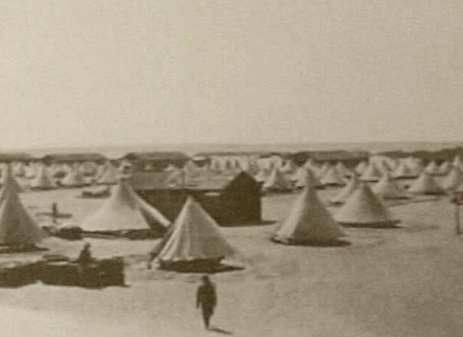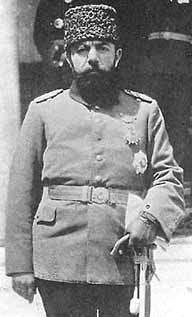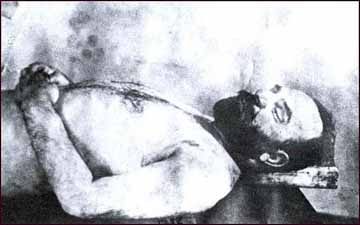|
|
The following are excerpts from the book:
"A Myth of Terror," by Eric Feigl
|
|
|
| A
Real Telegram by Talaat Pasha |
The Relocation Decision: Its Causes and Consequences
Armenians the world over remember April 24 as the day on which "the genocide of the
Armenians began". This memory should be reconsidered for a number of reasons. The day
of remembrance, April 24, intentionally confuses cause and effect.
The Ottoman minister of tile interior, Talaat Pasha, did indeed send a telegram on the
24th of April, 1915 ordering the arrest of the insurgents. There was still no talk,
however, of a relocation, since it was still not seen as necessary.
The coded telegram went to the governors of the provinces effected by Armenian subversion
and read as follows:
"Once again, especially at a time when tile state is engaged in
war, the most recent rebellions which have occurred in Zeitun, Bitlis, Sivas and Van have
demonstrated the continuing attempts of the Armenian committees to obtain, through their
revolutionary and political organizations, an independent administration for themselves in
Ottoman territory. These rebellions and tile decision of the Dashnak Committee, after the
outbreak of war, immediately to incite the Armenians in Russia against us, and to have the
Armenians in the Ottoman state rebel with all their force when the Ottoman army was at its
weakest, are all acts of treason which would affect the life and future of the country.
It has been demonstrated once again that the activities (it these committees, whose
headquarters are in foreign countries, and who maintain, even in their names, their
revolutionary attributes, are determined to gain autonomy by using every possible pretext
and means against tile Government. This has been established by the bombs which were found
in Kayseri, Sivas and other regions, also by the actions of the Armenian committee leaders
who have participated in the Russian attack on the country, by forming volunteer
regiment,, comprised of Ottoman Armenians in the Russian army, and through their
publications and operations aimed at threatening the Ottoman army from the rear.
Naturally, as the Ottoman Government will never condone the continuation of such
operations and attempts, which constitute a matter of life and death for itself, nor will
it legalize the existence of these committees which are the source of malice, it has felt
the necessity to promptly close down all such political organizations.
You are therefore ordered to close down immediately all branches, within your province, of
the Hinchak, Dashnak, and similar committees; to confiscate the files and documents found
in their branch headquarters, and ensure that they are neither lost nor destroyed; to
immediately arrest all the leaders and prominent members of the committees, together with
such other Armenians as are known by the Government to be dangerous; further, to gather up
those Armenians whose presence in one area is considered to be inappropriate, and to
transfer them to other parts of the province or sanjak, so as not to give them the
opportunity to engage in harmful acts; to begin the process of searching for hidden
weapons; and to maintain all contacts with the (military) commanders in order to be
prepared to meet any possible counter actions. As it has been determined in a meeting with
tile Acting Commander-in-Chief that all individuals arrested on the basis of files and
documents which come into our possession in the course of the proper execution of these
orders are to be turned over to the military courts, the above mentioned steps are to be
implemented immediately. We are to be informed subsequently as to the number of people
arrested, and with regard to the implementation of these orders.
For Bitlis, Erzurum, Sivas, Adana, Mara* and
Aleppo: as this operation is only intended to affect the operation of the committees, you
are strongly ordered not to implement it in such a manner as will cause mutual killings on
the part of the Muslim and Armenian elements of the population.
11. April 1331 (24. April 1915).
Minister of the Interior"
|
The rebels ...
completely destroyed the Moslem part of the city. Some 30,000 Moslems lost their lives
in the violence.
|
The arrests ordered on April 24 began the following day in Istanbul. In tile
provinces they began somewhat later in some cases. These arrests only affected the
ringleaders of the Dashnaktsutiun and the Hunchaks, along with a few well-known
agitators. The order had absolutely nothing to do with a general relocation.
The government's order to move the Armenians as a group out of the endangered areas
(Istanbul and Izmir were not affected since they were considered "safe"
and "under control") did not come until months later. It was brought on by
the horrifying assault of Armenian terrorists and irregulars on the city of Van.
This event represented a shocking climax of Armenian terrorism. The rebels conquered
Van, declared an "Armenian Republic of Van", and completely destroyed the
Moslem part of the city. Some 30,000 Moslems lost their lives in the violence.
 |
|
Prof.
Erich Feigl in the 2000s ("Sari Gelin")
|
Once again, the idea of moving the Armenian
population (and not just the terrorist ringleaders) out of the endangered areas did
not arise until after the catastrophe of Van. The government troops were forced by
the rebels to leave Van, on May 17, 1915. At this time, Van was behind Russian
lines, which were moving deeper and deeper into eastern Anatolia. The spearhead of
the Russian-Czarist assault troops was made up of Armenian volunteers, who
distinguished themselves with their particularly brutal treatment of the Moslem
population of eastern Anatolia. In the meantime, the true dimensions of the
catastrophe of Van became known in Istanbul. It was at this point that the idea
arose of relocating the Armenian population of Anatolia as a whole. Until this time,
there had only been arrests of ringleaders and known terrorists on a local level —
nothing more.
The concept of a relocation came up when the acting commander of the army, who had
learned his lesson from the horrid Outcome of the Van revolt, suggested responding
to steps taken by the Russians (which appear to have been discussed with the
Armenians!) with similar measures from the Ottoman side, This suggestion was made in
a secret communique of the Minister of the Interior (No. 2049):
The Armenians around tile periphery of Lake Van, and in other
regions which are known to the Governor of Van, are engaged in Continuous
preparations for revolution and rebellion. I am of the opinion that this population
should be removed from this area, and that this nest of rebellion be broken up.
According to information provided by the Commander of the Third Army, the Russians,
oil April the 7th (April the 20th), began expelling their Muslim population, by
pushing them, without their belongings, across Our borders. It is necessary, in
response to this (Russian) action, and in order to reach tile goals that I have
outlined above, either to expel the Armenians in question to Russia, or to relocate
them and their families in other regions of Anatolia. I request that tile most
suitable of these alternatives be chosen and implemented. If there is no objection,
I would prefer to expel the creators of these centres of rebellion and their
families outside our borders, and to replace them with the. Muslim refugees pushed
across our borders.
19. April, 1331 (2. May 1915).
The importance of this document lies in the fact that it clearly states what the
Supreme Military Commander's motive was. The Russians had sent the entire Moslem
population of the Caucasus region to eastern Anatolia, leaving them with nothing but
the shirts on their backs. At the same time, the Armenians in the eastern part of
the Ottoman Empire (particularly in Van) had siezed total power, killed the Moslems,
and proclaimed their "Armenian Republic of Van". Under these
circumstances, the decision to relocate the Armenians of Anatolia — those living
within the borders of the Ottoman Empire — is understandable. They were to be
moved "to areas considered safer", areas not so exposed to the grasp of
the Russians and the Allied powers of Europe.
(Holdwater: for a better
idea of the sequence of events, this May
2 telegram from Enver Pasha to Talat addresses the banishment of Russian
Moslems, and discusses the avenues for action: relocation or actual deportation, for
the Armenians.)
|
| To
try to place blame for a wartime tragedy such as this is truly senseless |
A few weeks later, on May 19,1331 June 1, 1915), the Ottoman
government published the following decree in the Takvimi Vakaya (the Ottoman official
gazette):
Article 1. In time of war, the Army, Army Corps, and
Divisional Commanders, their Deputies, and the Independent Commanders, are authorized and
compelled to crush in the most severe way, and to eradicate all signs of aggression and
resistance by military force, should they encounter any opposition, armed resistance and
aggression by the population, to operations and measures relating to orders issued by the
Government for the defense of the country and the maintenance of order.
Article 2. The Army, Army Corps, and Divisional Commanders are authorized to
transfer and relocate the populations of villages and towns, either individually or
collectively, in response to military needs, or in response to any signs of treachery or
betrayal.
Article 3. This provisional law will come into effect when it is published.
It is undoubtedly true that many innocent people lost their property, their health, and
even their lives in the relocation of 1915 — many Armenians and even more Moslems. To
try to place blame for a wartime tragedy such as this is truly senseless, but in light of
the almost universal assumption that everything was the fault of the "Terrible
Turks," something must be said about the passive behavior of the overwhelming
majority of Ottoman Armenians at the time. Above all else, they just wanted peace, and
they remained silent because they did not want a confrontation with the terrorists. For
decades, they tolerated the presence of a small number of fanatics among them who held
absurd, impracticable, and completely unjust ambitions for independence (unjust because
the Armenians did not have a majority anywhere in the Ottoman Empire). The extremists
became more and more Powerful; they terrorized Moslems and Armenians; and eventually,
after the beginning of the First World War," they were openly waging civil war.
In the turmoil of the war, with the Ottoman Empire forced to fight
for its very existence, there remained no other choice but to carry out the relocation.
The events that followed the end of the war — when the Allies penetrated into Anatolia
and the Greeks advanced almost as far as Ankara — prove just how wisely those
responsible for the relocation had acted.
If the "silent majority" of Ottoman Armenians had objected to
the insane plans of the extremists and the "romantic" visions of the
missionaries, many Armenians and even more Moslems would have been spared tremendous
suffering. As it was, however, many had to pay for the offenses of a minority.
Often — far too often — it is the success of the rational, level-headed majority in
prevailing over the irrational minority of agitators, fanatics, and romantics which
determines whether or not disaster will befall a nation.

A relocation camp ("Sari Gelin")
No nation that has let itself be seduced or silenced by a minority has ever been spared.
The National Socialists in Germany were also a minority, but they forced the majority of
peace-loving Germans into a world war. In the end, all Germans had to pay for that war —
with their property, their homes, their lives — whether they had been National
Socialists or not.
It would seem that the horrible thing about the history of the Armenians is that the
overwhelming majority of hardworking, intelligent, highly educated Armenians have let
themselves be manipulated, blackmailed, misled, and oppressed by a handful of fanatics
waging an irrational campaign of revenge. This majority silently ignores the acts of
terror of the "task forces" or "freedom fighters" or whatever else the
terrorists choose to call themselves. They fear for their property, their safety, their
lives. They give money to the terrorist groups without saying anything, and they act as if
nothing has happened when another bomb goes off, killing more innocent, respectable
citizens. it was no different before the First World War. Today, the myth of the genocide
has been added. This will have to suffice as a rationalization, even if the truth is
totally different.
|
The
fundamental message of Franz Werfel's novel — that those in charge within the
Ottoman government issued an extermination order — is false.
|
Franz Werfel's world-famous novel, The Forty
Days of Musa Dagh, is supposed to be a "modem saga of a persecuted
minority, determined to fight back". It is supposed to "snatch from the
Hades of all that was, this incomprehensible destiny of the Armenian nation".
The American edition of the novel was the basis for Werfel's worldwide fame.
According to the blurb on a German edition, the novel was seen not only by the
Armenians, but also by the Jews as "a simile for the Suffering of their
people". But the central, the fundamental message of Franz Werfel's novel —
that those in charge within the Ottoman government issued an extermination order —
is false.
In Werfel's version, the macabre scene between the Ottoman Minister of War, Enver
Pasha, and the Minister of the Interior, Talaat Pasha (who are portrayed as being
responsible for a genocide) reads as follows:
"A secretary brought in a sheaf of dispatches, which Talaat began to sign
without sitting down again. He did not look up has we was speaking: 'These Germans
are only afraid of the odium of being made partly responsible. But they may have to
come begging to us for more important things than Armenians,'
This might have ended that day's discussion of the banishment, had Enver's
inquisitive eyes not rested on the dispatches in casual scrutiny. Talaat Bey noticed
his glance and made the papers rustle as he waved them. 'The precise directions for
Aleppo. Meanwhile, I suppose, the roads will be clearer again. In the next few weeks
Aleppo, Alexandretta, Antioch, and the whole coast can begin to move out.'
‘Antioch and the coast?’ Enver repeated interrogatively, as though he might have
something to say on the point. He did not speak another syllable but stared
enthralled at Talaat's fat fingers, which, irresistible as a storming-party, kept
scribbling signatures under texts. These same forthright and stumpy fingers had
composed that order, sent out to all walis and mutessarifs: 'The goal of these
deportations is annihilation.' The short pen-strokes showed all the impetus of
complete, implacable conviction; they had no scruples.
 |
|
Jemal
Pasha, before...
|
Jemal Pasha fares surprisingly well in Johannes
Lepsius' book Deutschland und Armenien (which Franz Werfel used extensively
in writing his "Forty Days"). This is reflected in an indirect statement
from Werfel concerning Jernal Pasha. At one point in his novel, the following is
said disparagingly about a zealous young Turk:
"One of the younger Mudirs went so far as to claim that Jernal Pasha, in spite
of his well-known role in the government, was not entirely reliable as concerns, the
Armenians and even made a deal with them in Adana."
Just how seriously the Armenian extremists take such statements is illustrated by
the fact that in the current American edition of the "Forty Days"
(published by Carroll & Graf Publishers, New York, by arrangement with Viking
Pengiun, Inc.), this passage has simply been dropped. A very meticulous proofreader
(or more accurately, censor) crossed out all the paragraphs in Werfel's novel that
approach objectivity. In the case of Jemal Pasha, it was apparently a matter of
justifying the murder of a man who did everything humanly possible for the
Armenians.
|

|
|
Jemal Pasha, after. Along with his young adjutant
(Yaver) Süreyya Bey, Jemal Pasha was murdered by the Armenians in Tiflis on
July 25, 1922, even though he had always helped them in every way possible
while he was serving as military commander of Syria.
|
The Armenian
forces interested in the fight against Turkey know the weak points in, Franz
Werfel's novel all too well. One such point occurs where the author strays into the
realm of historical facts. He meant well, but he was terribly careless in gathering
his data and thus had the uprising of Van breaking out 4fter the issuing ot the
relocation order.
Franz Werfel told it like this:
'The raison d'etat has never depended on making a graceful volt between cause and
effect. The bad, but lazy conscience of the world, the press of the respective
groups in power, and the minds of the readers, which the press has cut to size, have
always twisted and understood the issue as was required at that particular
time."
It is as if the censor who eliminated this passage from the English translation must
have meant to strike the next one, which is also missing:
"On the subject of Van, one could in certain circles write with indignation and
read with even more indignation: 'The Armenians have taken up arms against the
Ottoman Nation, which is involved in a burdensome war, and they have gone over to
the Russian side. The vilayets inhabited by Armenians must therefore be freed from
these people through deportation.'
Similar things could be read in the Turkish bulletins, but not the reverse, which
was the truth: 'The Armenians of Van and Urfa, in despair over the deportations,
which had been proceeding for a long time, defended themselves against the Turkish
military forces until they were relieved by the arrival of the Russians."'
|
|
It is certainly true that Franz Werfel, who
relied entirely on Armenian sources and a certain Johannes Lepsius in writing The
Forty Days of Musa Dagh, was convinced of the truth of what he wrote - that, the
uprising of Van was a reaction to a relocation order, a sort of desperate attempt at
self-defense.
The truth is just the opposite: the uprising was the prelude to a civil war
in the eastern province of Van and began in February of 1915 — almost two
months before the relocation order, which was a consequence of the
uprising of Van. In no way was the uprising of Van a "defensive reaction"
to the relocation order - that is really the truth turned on its head!
(Holdwater interruption:
The first rebellion
occurred in Van, days after Russia had declared war in November of 1914 —
almost six months before the end-of-May relocation order.)
The Armenian circles that shorten and mutilate Werfel's novel in the English edition
know exactly why they must take these passages — in this particular case a
whole page — out of the book. (There is, by the way, not one word to
indicate that the novel has been altered in this fashion.) Today, there are a few
scattered historical works in which anyone who is interested can find out about the
true events and the sequence in which they occurred. In some libraries, one can even
still find publications in which the Armenians boast of their war with the Ottomans,
although these publications have now disappeared from nearly all libraries, and it
has become truly difficult to find a magazine like Der Orient, put out by
Johannes Lepsius.
The Minister raised up his bent torso. 'That's done. In the autumn I shall be able
to say with perfect candour to all these people: >La question armenienne n'existe
pas.<"
With this choice of words, Franz Werfel anticipates almost prophetically the "Wannsee
Conference", where the leaders of the Third Reich — diabolical figures like
Himmler and Kaltenbrunner — agreed upon the extermination of the Jewish people.
The key scene in The Forty Days of Musa Dagh — the scene in which Enver
Pasha and Talaat Pasha decide on the extermination of the Armenians — is for many
people a sufficient rationalization for blind terror and savage acts of vengeance.
They ignore the fact that Franz Werfel's argumentation rests entirely on the forged
"documents" of Aram Andonian.
Werfel's novel is based on his personal knowledge, which he acquired from Armenian
contacts — undoubtedly in good faith. When he realized that he had been taken in
by forgeries, fear of Armenian reprisals kept him from acknowledging the truth. (We
will come later to the statement made on this subject by a Jewish friend of Franz Werfel.)
From ataa.org; Feigl's emphasis on words later added by Holdwater
|
| If history is to be examined,
one may observe that those who were living in the war regions hindered the actions of
the military units by protecting traitors and groups which acted together with the
enemy were sent away from the fronts. Another purpose of the transportation and
settling is to prevent the civilian people to suffer from war.
We see that some other states did also apply such obligatory
emigration practices, in the later years.
It is well known that the Alsaces, who lived in the
Franco-German border area, and spoke German, were taken away from the east of the
Maginot line in the winter of 1939-1940 and were transported to the southwest part of
France, especially to the Dordogne region by the Radical Socialist French Government.
Similarly, the American Administration had forced some of her citizens of Japanese
origin to emigrate from the Pacific region to the Mississippi Valley following the
Pearl Harbor attack and accommodated them in camps until the end of the war. (Acquaintances,
Oxford, U.P., 1967)
"Armenian Claims and Realities," Dr. Hüsamettin Yildirim,
Ankara, 2001, p. 38
|
A LESS COMPELLING EXAMPLE OF RELOCATION
AS A "MILITARY NECESSITY":
After the Pearl Harbor attack, anti-Japanese hysteria spread in the
government. One Congressman said: "I'm for catching every Japanese in America, Alaska
and Hawaii now and putting them in concentration camps. Damn them! Let's get rid of
them!"
Franklin D. Roosevelt did not share this frenzy, but he calmly signed Executive Order
9066, in February 1942, giving the army the power, without warrants or indictments or
hearings, to arrest every Japanese-American on the West Coast — 110,000 men, women, and
children — to take them from their homes, transport them to camps far into the interior,
and keep them there under prison conditions. Three-fourths of these were Nisei —
children born in the United States of Japanese parents and therefore American citizens.
The other fourth — the Issei, born in Japan — were barred by law from becoming
citizens. In 1944 the Supreme Court upheld the forced evacuation on the grounds of military
necessity. The Japanese remained in those camps for over three years.
Holdwater: But even with this outrage —
unlike the Ottoman-Armenians who had wholly joined the Entente Powers and were
"belligerents de facto," in Boghos Nubar's words, Japanese-Americans were not
disloyal — the young men of this community made a point of serving in the United States
military to demonstrate their affinity to their country.
Thanks to reader Conan for the above excerpt, from this site.
|
|